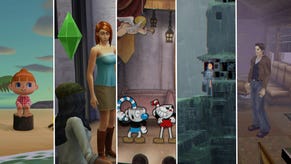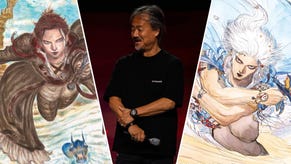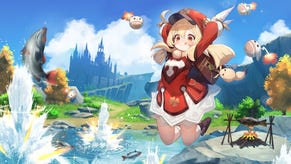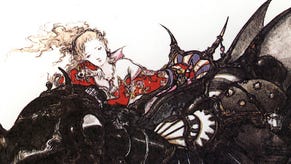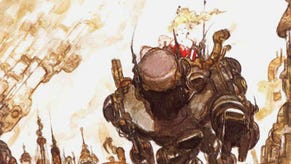Final Fantasy FAQ and Beginner's Guide: The Best, Worst, and Weirdest Final Fantasy Games
Interested in learning more about the world's most popular RPG series? Here's everything you need to know: what Final Fantasy is, how it plays through, what are the best and worst games in the series - and where you should get started!
This article first appeared on USgamer, a partner publication of VG247. Some content, such as this article, has been migrated to VG247 for posterity after USgamer's closure - but it has not been edited or further vetted by the VG247 team.
With remakes of Final Fantasy X and X-2 out next week, Final Fantasy XIV gaining plenty of traction as it expands to new platforms, and the recent launches of Final Fantasy spin-offs Lightning Returns and Bravely Default, there's been an awful lot of "Final Fantasy" going on around here of late.
But knowing that there are 14 games in the main Final Fantasy series alone, a 15th on the way, and an untold number of spinoffs lurking about at the edge of vision... well, that can make the idea of dipping your toe into Square Enix's biggest franchise seem awfully intimidating. I mean, how on earth does a series undergo such baroque permutations that there can be a part XIII-2? What does that even mean!? Despite the complexities of their mere existence, though, the games really are worth exploring; at its best, Final Fantasy has brought us some of the greatest console role-playing games ever.
Rather than start at the beginning and slogging through more than 25 years of RPGs, we recommend you start with this primer. We'll help you get started down the road to Final Fantasy by calling out the most accessible games in the series, the best spin-offs, and more. We've also drawn attention to the games that demand expert understanding or, um, a high tolerance for the series' unique quirks. Everything you need to know to get started is right here.
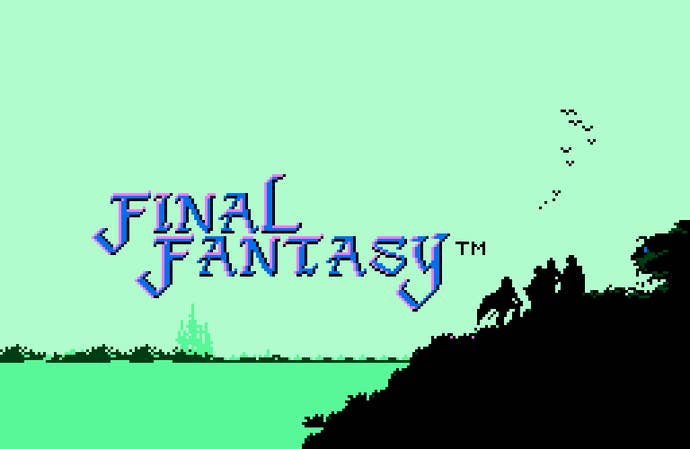
What is Final Fantasy?
A franchise of role-playing games and related spin-offs, created and published by Square Enix (formerly Squaresoft). The original Final Fantasy debuted in 1987 for NES. The series' name was inspired by the fact that Squaresoft was in dire financial straits at the time, and the creators of Final Fantasy (including director Hironobu Sakaguchi) expected it to be the company's last hurrah. However, the game actually turned out to be a huge success, especially when it was released in America three years later, and – far from being a last hurrah – it inspired many sequels. Yes, it's very amusing that there's a game called "Final" Fantasy "XIV." Thank you for noticing.
Final Fantasy was one of the many console role-playing games to come from Japan in the wake of Dragon Quest, but it set itself apart a few ways. One, it wore the influence of western RPGs (particularly Dungeons & Dragons) on its sleeve. Two, it took a much grander scale than its contemporaries, spanning the world via multiple forms of transportation and eventually sending players through time. And finally, it looked and sounded great, thanks to enemy designs by illustrator Yoshitaka Amano and a rockin' soundtrack by composer Nobuo Uematsu.
Final Fantasy has changed radically over the years, and none of the team behind the original remains at Square (though Uematsu and Amano freelance from time to time). Even so, a thread of evolution runs throughout the series, and you can recognize certain concepts and elements in every game.
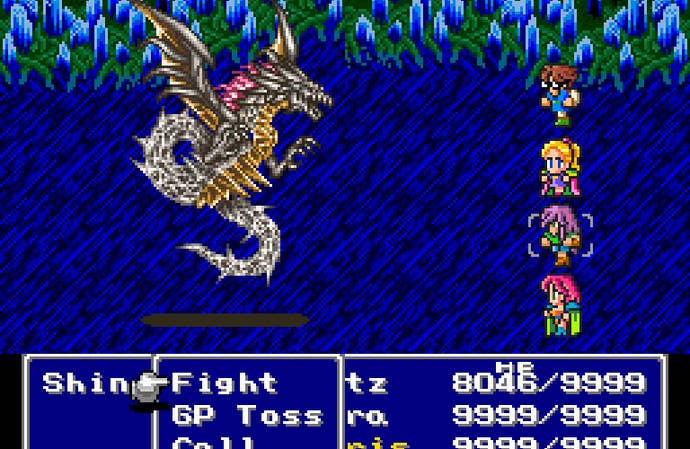
How does Final Fantasy play?
Depends on the game. Final Fantasy has always been synonymous with role-playing, so no matter how action-oriented or linear the game, it always contains certain consistent mechanics – character growth, magic, combat, that sort of thing. Much of what makes Final Fantasy what it is has to do with a inconsistency, a constant sense of flux; no two games in the series play exactly alike, and each chapter has its own distinct skill system and battle rules.
At its most fundamental level, Final Fantasy sends a party of explorers venturing into the world to visit towns and find essential items that will help them save the world. Sometimes combat happens randomly; sometimes not. Some games use strict turn-based battles, while others combine turn-based and real-time concepts in a format known as Active-Time Battle. Others (especially the MMO chapters) make combat encounters a totally seamless element of play.
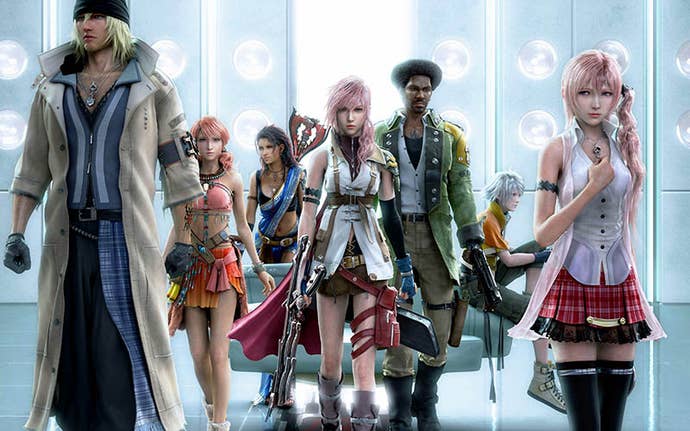
Do I need to play the games in order?
Not in the least. If you're interested in experiencing the series' evolution, sure. But none of the "core" entries – the ones whose title is "Final Fantasy" followed by only a Roman numeral – have any story connection to one another in the least. Furthermore, few Americans played the series in its intended order, since several of the early games (Final Fantasy II, III, and V) didn't make it to the U.S. until the late '90s.
Please note that several of the numbered entries do have direct sequels (Final Fantasy X-2, Final Fantasy XIII-2 and Lightning Returns, etc.), so you'll probably want to play those in their proper sequence. And then there's the mess of releases surrounding Final Fantasy VII; honestly, if you just play FFVII and follow it with Crisis Core, you'll be doing fine.
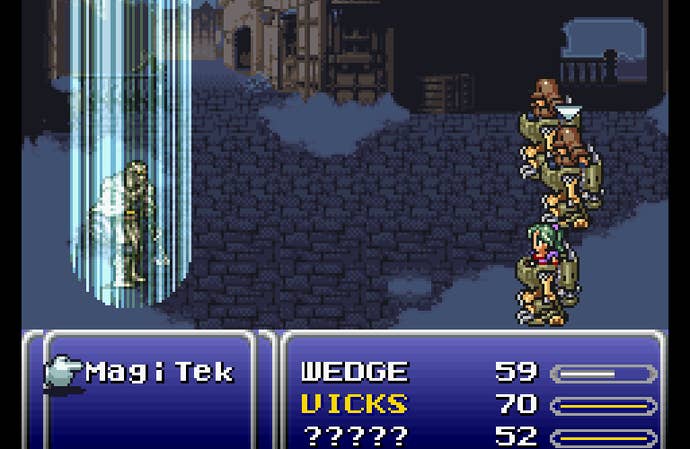
Which Final Fantasy games are best for beginners?
Instead of playing the series in order, you might be better off tackling them based on their complexity or approachability.
- Final Fantasy VI: Back when it was called "Final Fantasy III," the final 16-bit chapter of the series went a long way toward winning fans. With great graphics, a catastrophically epic story, a cast of lovable characters, and an extremely low difficulty level, FFVI makes a great jumping-in point.
- Final Fantasy VII: Everyone who didn't get into Final Fantasy with FFVI probably came aboard a few years later when its sequel arrived. With the most iconic cast and story in the series, FFVII changed not only the franchise but the shape of RPGs... and games in general.
- Final Fantasy IX: In stark contrast to the progressive futurism of most Final Fantasy games, the ninth installment deliberately adopted a more fantastic, medieval feel. Despite the grand scope of its plot, its character-centric design gives it a warmth unique to the series, while the highly constrained skill system makes the needs and consequences of character-building straightforward.
- Final Fantasy X: The most linear Final Fantasy prior to FFXIII, the tenth chapter offers a lot of subtle complexity in its design... but thanks to its tactical turn-based combat system, even a beginning player will never feel rushed or overwhelmed.
- Final Fantasy XIV: While undoubtedly the most complex of these games due to its being an MMO, FFXIV offers some of the lowest barriers to entry of any online RPG ever. It eases you into the world of online gaming and smooths over the complicated elements of the genre as best as possible.
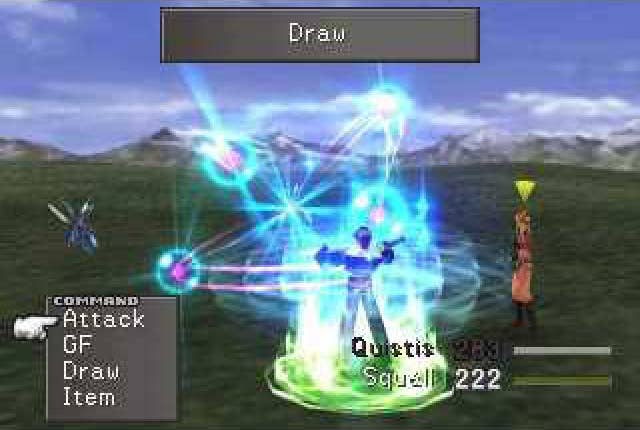
Which should I play once I get the hang of things?
Got the idea? Great. Now that you grasp the fundamentals of how everything works together in Final Fantasy, check out these games. They tend to have more complex inner workings, more challenging combat, or more abstract design – but they're still great.
- Final Fantasy V: By building on the Job system of Final Fantasy III, FFV stands as one of most flexible yet thoughtfully balanced role-playing games ever made. There's a reason people play through this every year in complex new permutations under self-imposed limitations – no matter how you approach it, FFV can be beaten by a savvy player.
- Final Fantasy VIII: Easily the strangest core Final Fantasy ever, FFVIII threw out most of the elements players took for granted about the series – the importance of leveling up, the ability to collect cash from fallen foes, the permanence of magic – for a love/hate experimental venture that plays like no other RPG.
- Final Fantasy XII: In its attempt to reproduce the feel of Final Fantasy XI's MMO stylings in a single-player RPG, FFXII changed a lot of mechanics and occasionally fell flat... but its vast, open, free-form world and customization options more than made up for it.
- Final Fantasy Tactics: Combining the Job system of FFV with the challenging, tactical combat of Tactics Ogre, FFT became one of the most beloved chapters of the series despite coming directly after Final Fantasy VII – its direct antithesis.
- Lightning Returns: Another love it/hate it affair, Lightning Returns brings the Final Fantasy XIII saga to a rather superfluous finale... but ignore the boneheaded story and what you'll find is an open-world action RPG with excellent combat mechanics, extensive customization, and an interesting time limit mechanic.
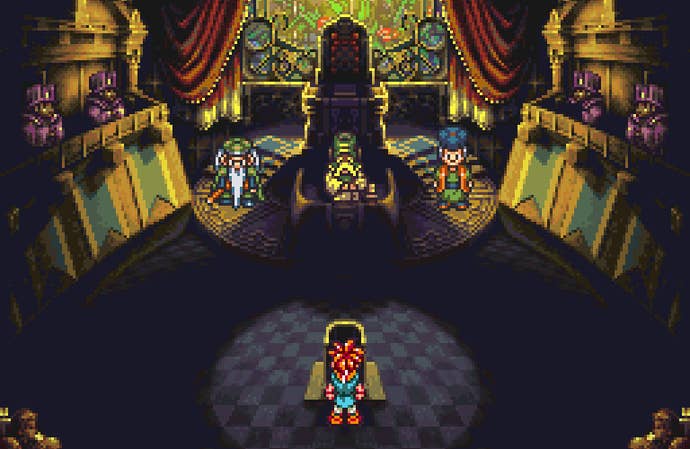
What are the best Final Fantasy spin-offs?
Through the years, Final Fantasy has inspired a number of spin-offs – some direct, some incidental. While these games may not bear much resemblance to the core Final Fantasy titles, they carry forward its spirit of excellence and are a lot of fun in their own right.
- Secret of Mana: The sequel to Final Fantasy Adventure for Game Boy, Secret of Mana struck out in its own direction with faster, more action-packed mechanics and engrossing multiplayer support for up to three (!) people at a time. It's also glitchy as all heck, but it's so entertaining you won't care.
- Final Fantasy Fables: Chocobo's Mystery Dungeon: Though not the first Final Fantasy-inspired roguelike, this Wii RPG is definitely the best. Taking a page from other Mystery Dungeon games, Chocobo's Mystery Dungeon lowers the genre's overall hostility level and makes clever use of the classic Job system to create a fun, funny random-dungeon romp.
- Chrono Trigger: As a collaboration between the creators of Final Fantasy and Dragon Quest, this SNES classic offers the best of both franchises: Both lightheartedness and epic scope; both accessibility and depth; and both fantastic graphics and excellent music. It's so good you'll want to play it over and over... and, handily, the New Game + feature lets you do exactly that.
- Theatrhythm Final Fantasy: The inevitable music game spin-off... which is pretty entertaining. Maybe that's to be expected, given the series' legacy of excellent music. The use of combat metaphors during play adds an extra touch of class.
- Final Fantasy Legend II: Though not actually a Final Fantasy game, this English version of SaGa II (yes, as in SaGa Frontier) features a great story and surprisingly robust play mechanics for an 8-bit RPG – especially a portable one.
- Bravely Default: Originally a sequel to Final Fantasy: The 4 Heroes of Light, the team behind this 3DS RPG spun it away so that it could stand on its own. The funny thing is, though, that it still retains a lot of the series' trademark elements and in many ways feels more like what old-school fans think of as "Final Fantasy" than the modern sequels.
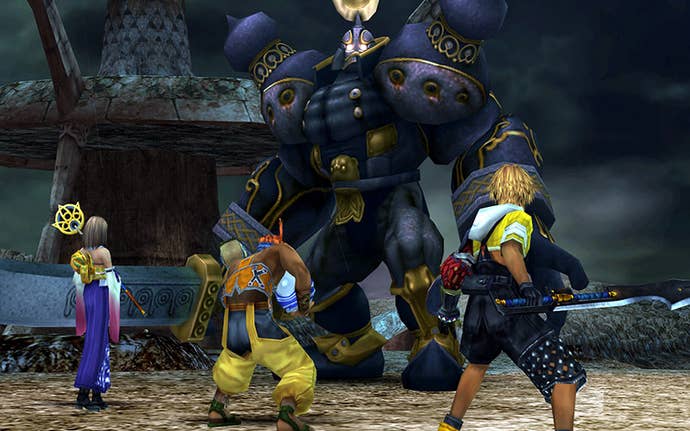
Which Final Fantasy games have the best stories?:
Being role-playing games in the classical sense, Final Fantasies are all about the story. However, those stories definitely aren't created equal, and they often become so mired down in jargon, double-crosses, or muddled scripting that you're ultimately left wondering, "What on earth?" Here then are the five Final Fantasy plots that manage to walk the fine line between "complex" and "comprehensible" without losing their balance.
- Final Fantasy IV: A breakneck soap opera of a game, Final Fantasy IV was the first entry in the series to put the emphasis on its characters and their relationships – perhaps not surprisingly, given that scenario director Takashi Tokita had a background in theatre. Even though it lays on the melodrama a bit thick (to say the least), FFIV revolves around the personal journey of its protagonist... which just so happens to coincide with his saving the world.
- Final Fantasy VI: Probably the most entertaining and accessible Final Fantasy storyline, FFVI manages to be grand without degenerating into gobbeldegook. Its decentralized character focus lets several protagonists take a turn in the spotlight, and a world-shaking event midway through the story helps keep the overall purpose of the game front-and-center.
- Final Fantasy X: Although it can be a little weird sometimes, with its pastiche of Okinawan culture, techno-fantasy, and strident declamations of Western religion, FFX ultimately tells parallel tales of a woman's quest to save the world from an inconceivable force and a young man's quest to learn more about himself and his father. Handily, these two threads are closely intertwined.
- Final Fantasy Tactics: Deeply complex and political on a grand scale, Final Fantasy Tactics' storyline expects players to pay close attention to its goings-on. The reward for your efforts, however, is easily the most nuanced and intricate tale in the franchise's history – one that works on both a political and person scale.
- Final Fantasy XIV: The first version of FFXIV was so crummy that Square Enix remade the game. In making the transition, they also blew up the world. FFXIV's reboot, A Realm Reborn, concerns the world's rebirth and the mysteries that surround it, making it at once intriguingly metatextual and classically Final Fantasy-ish.
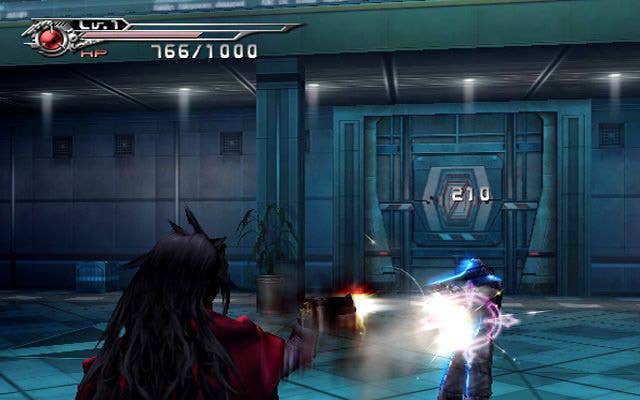
Which Final Fantasy games should I avoid?
Not every Final Fantasy game has been a winner. Some have been too ambitious for their own good, and some are just plain bad. These five in particular are best approached with caution, or at least with a firm understanding of their quirks.
- Final Fantasy II: The first sequel in the franchise basically threw out all the rules and mechanics established in the first game for a convoluted system which gave characters incremental upgrades per skill or attribute based on individual use of said skills and attributes. This tedious, complex system was quickly abandoned for FFIII.
- Dirge of Cerberus: This spinoff of Final Fantasy VII has the distinction of being quite possibly the worst Final Fantasy game ever. A clumsy action shooter whose main appeal came from graphics that now look horribly dated, Dirge needlessly complicates FFVII's story with stupid characters and twists. Somehow, it managed to make the game's coolest character, Vincent Valentine, and make him the object of hate and derision.
- Final Fantasy Tactics A2: The second sequel to Final Fantasy Tactics isn't bad, per se, but it has a totally meaningless story while overcomplicating basic play mechanics to the point of uselessness. A broken and disappointing letdown given its pedigree.
- Final Fantasy IV: The After Years: Spot a theme yet? Yet another superfluous sequel; this one follows on the heels of the classic Final Fantasy IV, following the protagonist's son Ceodore on a journey of fanservice and recycled assets. Its difficulty balance is totally out of whack, alternating between cakewalk and brutal slog. Weird.
- Final Fantasy XIII-2: Though hardly a bad game by any means, it sits between FFXIII and Lightning Returns as an awkward middle point. It lacked the strong, focused narrative of FFXIII but hadn't yet matured into the open-ended design of Lightning Returns. Its main value is in serving as a narrative link between the two games... but honestly, the FFXIII saga's plot went so far off the rails it's hard to work up much enthusiasm there.
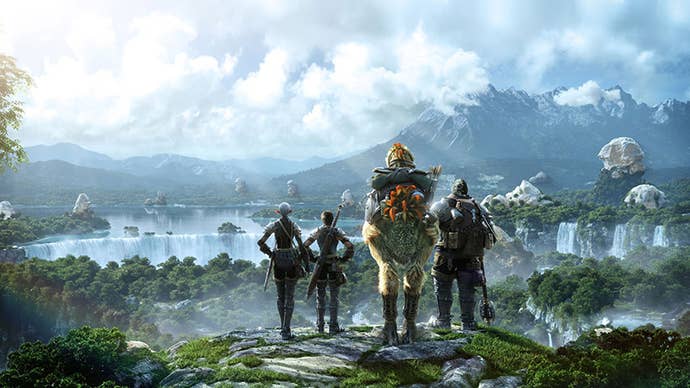
Which Final Fantasy games have the best soundtrack?
Can there possibly be anything more subjective than music? One man's symphony is another man's shredded eardrums. Nevertheless, we have opinions and we're not afraid to inflict them upon you.
- Final Fantasy IV: The move from 8-bit NES to 16-bit Super NES gave composer Nobuo Uematsu an amazing toolbox of sounds to work with, and he totally went for it. Combining rock, classical, and pure bombast, the FFIV soundtrack remains a high water mark for video game music in general. Those boss themes!
- Final Fantasy VI: Possibly Uematsu's most diverse and nuanced work for the series, the FFVI soundtrack includes opera-like leitmotifs for more than a dozen characters... and an actual opera, too. While hindered somewhat by technical limitations, the FFVI soundtrack offered a stunning glimpse into what music can do to enrich a game experience.
- Final Fantasy Tactics: The Tactics' soundtrack consists of tunes that had to work in a different context than the core games' short battle sequences. The result is a rich, symphonic, and frequently dark collection of music that set Tactics apart at the time... and nowadays links it neatly to other games set in the land of Ivalice, such as Vagrant Story and FFXII.
- Final Fantasy XIII: Love or hate the game, it's hard not to be won over by the excellent soundtrack, which combines the classic Final Fantasy style with a harder, more electronic sound. It can be surprisingly diverse, too, as seen in presence of funky jazz and ethereal vocal pieces.
- Final Fantasy XIV: In many ways a return to form for the series' compositions, the FFXIV soundtrack follows you as you travel through Eorzea, shifting dynamically to reflect the situation onscreen. And when you're done playing, it continues to follow you around, the way the best earworms tend to do.


